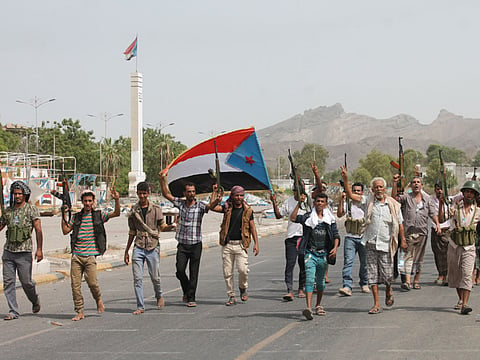Exiled government ministers return to Yemen’s Aden
Al Houthis’ loss of Aden may mark a turning point in the conflict that has killed more than 3,500 people

Aden: Senior members of Yemen’s exiled administration flew into Aden on Thursday to make preparations for the government’s return, an official said, three months after being pushed out by the armed Al Houthi militias.
The visit by ministers and intelligence officials follows military setbacks for the Al Houthis at the hands of Saudi-backed Yemeni fighters which may mark a turning point in the conflict that has killed more than 3,500 people.
The southern port city of Aden has been a focus of fighting since the Al Houthis first laid siege to it in March when it was home to the government which subsequently fled to Saudi Arabia.
“[Exiled President] Abd-Rabbo Mansour Hadi delegated this group to return to Aden to work to prepare the security situation and ensure stability ahead of a revival of the institutions of state in Aden,” a local official said after the group arrived by helicopter at a military airbase.
The delegation included ministers of the interior and transport, a former interior minister, the intelligence chief and the deputy head of the house of representatives.
Local fighters have wrested Yemen’s airport and main seaport from the northern militia group in the past two days, in fighting that killed dozens of people, according to medics.
Yemeni officials said Al Houthis fired rockets at Aden airport, killing at least three people.
A government official said rebels fired Katyusha rockets that landed in the vicinity of the airport early Thursday.
In a statement to the Houthi-controlled Saba news agency, a spokesman said rebels are fighting back, and are advancing in a neighbourhood northwest of the airport. However, the government official said the Saudi-backed forces control about 80 per cent of Aden, which has been the scene of intense fighting since March.
Al Houthis seized Sana’a in September and pushed into Yemen’s south and east in March and April in what they say is a revolution against a corrupt government and radical Islamist militants.
In a statement posted on Al Houthi-controlled state media, the group said it was weathering the Aden offensive, which has been supported by air strikes by a Saudi-led coalition which seeks to return exiled President Hadi to power.
“Over 150 air strikes did not deter the advance of the army and popular committees in achieving victories against the elements of extremism, Al Qaida terrorism, Hadi forces and Saudi mercenaries,” news agency Saba quoted a pro-Al Houthi military official saying.
Al Houthi forces fired Katyusha rockets at the Aden oil refinery west of the city, detonating an oil tank and causing a huge blaze, witnesses and officials said.
Arab coalition ships and warplanes bombed trucks carrying Al Houthi reinforcements towards the city, local fighters said.
Residents said they were starting to clear rubble and piles of trash in the districts won from Al Houthi militia which were being spared street battles for the first time in over three months.
The local fighters said they had put under siege the two main districts still under Al Houthi control, and that Arab coalition ships had shelled a main checkpoint outside the city.
Arab countries, particularly the UAE, have shipped around 100 armoured vehicles to the war effort, they said.
Militia officials said they were advancing, backed up by Saudi-led air strikes, toward one of Yemen’s most important airbases about 50km north of Aden.
Brigadier General Ahmad Asseri, spokesman for the Saudi-led coalition, said the gains were a joint effort between local fighters, army units, the exiled government and the alliance.
“There is daily, ongoing coordination to push the operations forward ... on the level of information, military training and especially supporting the air operations to achieve results on the ground,” Asseri told Saudi Ekhbariya TV.
—Reuters and AP
Sign up for the Daily Briefing
Get the latest news and updates straight to your inbox


